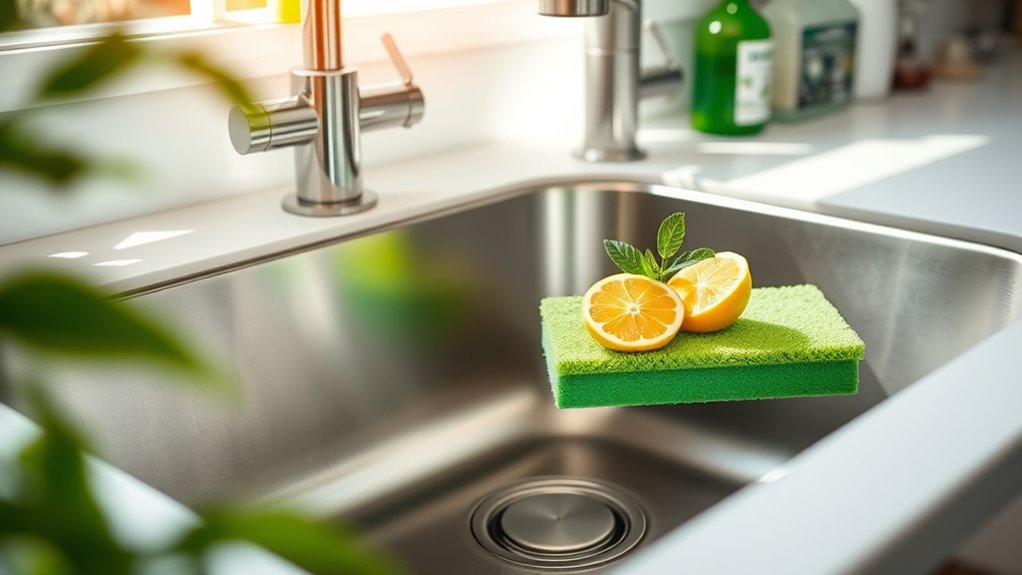To keep your green kitchen sink clean and odor-free, make eco-friendly cleaning a daily habit by rinsing and using natural agents like baking soda, vinegar, or lemon for deep cleans. Regularly inspect pipes for leaks, clear debris, and address slow drains promptly. Flushing with baking soda and vinegar helps neutralize odors naturally. Routine professional checks can also prevent big issues. Continue exploring for simple tips to maintain a fresh, sustainable sink environment.
Key Takeaways
- Regularly clean with eco-friendly agents like baking soda, vinegar, and lemon to neutralize odors and prevent buildup.
- Use drain strainers and clear debris from the trap to avoid blockages and foul smells.
- Rinse the sink after each use to eliminate soap scum, food residues, and maintain hygiene.
- Flush drains periodically with baking soda and vinegar, letting the fizz neutralize odors and dissolve mineral deposits.
- Schedule annual professional inspections to detect leaks, corrosion, and ensure optimal pipe performance.

Keeping your green kitchen sink clean and odor-free is essential for a fresh and hygienic kitchen environment. Regular plumbing maintenance is key to preventing clogs, leaks, and unpleasant smells that can develop over time. When you stay on top of your plumbing, you ensure water flows smoothly, and blockages don’t have the chance to produce odors or damage your sink’s structure. Incorporating eco-friendly cleaning practices not only benefits the environment but also keeps your kitchen safe and free of harsh chemicals that can linger or cause irritation. Using natural cleaning agents like baking soda, vinegar, and lemon is an effective way to maintain your sink’s cleanliness without compromising your eco-friendly values.
Keep your green kitchen sink fresh and odor-free with eco-friendly maintenance and natural cleaning methods.
To start, make it a habit to rinse your sink after each use, removing food debris and soap scum that can contribute to odors and build-up. Periodically, you should perform plumbing maintenance by inspecting the pipes beneath your sink for leaks or signs of corrosion. Clearing out any accumulated debris in the drain trap prevents blockages that cause standing water and bad smells. To keep your plumbing in top shape, consider using a drain strainer to catch food scraps and hair, reducing the risk of clogs. When you notice slow drainage, it’s a good idea to address it promptly with eco-friendly drain cleaners. These are typically made from natural ingredients and are safe for your plumbing and the environment.
For a natural approach to odor control, regularly flush your drain with a mixture of baking soda and vinegar. Pour about half a cup of baking soda into the drain, followed by a cup of vinegar. Let this fizz and sit for 15-20 minutes, then rinse with hot water. This process not only neutralizes odors but also helps break down grease and soap scum that can cling to pipes. Additionally, using lemon juice can add a fresh scent while helping to dissolve mineral deposits. Keeping your sink’s surrounding area clean and dry also prevents mold and bacteria growth, which can cause persistent smells. Incorporating plumbing maintenance into your routine helps prevent minor issues from escalating into major repairs or persistent odors.
Finally, consider scheduling professional plumbing maintenance annually to ensure everything functions at its best. Such routine checks can catch minor issues before they turn into costly repairs or cause unpleasant odors. When you combine regular plumbing maintenance with eco-friendly cleaning techniques, you create a healthier, more sustainable environment for your kitchen. Not only will your green kitchen sink stay sparkling and odor-free, but you’ll also contribute to a greener planet by avoiding harmful chemicals and reducing water waste. Maintaining your sink this way ensures it remains a functional, clean centerpiece of your kitchen that you can confidently enjoy every day.
Frequently Asked Questions
Can Natural Remedies Permanently Eliminate Sink Odors?
Natural remedies can help reduce sink odors, but they rarely offer permanent elimination. You might try baking soda, vinegar, or lemon juice to freshen your sink temporarily. However, for long-lasting results, you need to address underlying issues like clogs or buildup. Regular cleaning with natural solutions can improve odors, but persistent smells might require more targeted solutions or professional help to achieve permanent elimination.
How Often Should I Deep Clean My Green Kitchen Sink?
Imagine you’re in a 1920s speakeasy—your sink needs the same regular attention. You should deep clean your green kitchen sink at least once a month using effective deep cleaning techniques. This keeps it sparkling and odor-free. For a thorough sink cleaning schedule, consider weekly rinses and monthly deep cleans. This routine prevents buildup and maintains its vibrant look, ensuring your sink stays fresh and functional day after day.
Are There Eco-Friendly Products Specifically for Green Sinks?
Yes, there are eco-friendly cleaners designed specifically for green sinks. You can opt for natural options like baking soda, white vinegar, or plant-based cleaners for green maintenance. These products effectively clean without harming the environment or your sink’s finish. Using eco-friendly cleaners helps you maintain your green sink’s appearance while reducing chemical use, making your kitchen more sustainable and safe for your household.
Will Bleach Damage the Green Finish Over Time?
Bleach risks damaging the green finish over time, so it’s best to avoid using it regularly. Bleach can cause discoloration and finish damage, making your sink look worn. Instead, opt for eco-friendly, gentle cleaners designed for colored or matte surfaces. By steering clear of harsh chemicals, you preserve your sink’s vibrant hue and finish, ensuring it stays beautiful and functional for years to come.
How Can I Prevent Mold Buildup in My Sink?
To prevent mold buildup in your sink, regularly clean and dry the surface after use. Avoid leaving standing water, which can cause water stains and promote mold growth. Keep drain clogs clear to prevent water stagnation, and wipe down the sink with a mixture of vinegar and water weekly. This routine reduces moisture and mold-causing conditions, helping your sink stay clean and odor-free longer.
Conclusion
Taking good care of your green kitchen sink and keeping odors at bay isn’t complicated. Regular cleaning and using simple natural solutions can keep it looking fresh and smelling great. Don’t you want your kitchen to be a clean, inviting space? By staying consistent with your maintenance routine, you’ll enjoy a spotless sink and fresh air every time you cook or wash up. Why wait for problems when easy care can keep them at bay?









